![]()
![]()
![]()
Use LEFT and RIGHT arrow keys to navigate between flashcards;
Use UP and DOWN arrow keys to flip the card;
H to show hint;
A reads text to speech;
71 Cards in this Set
- Front
- Back
- 3rd side (hint)
|
What’s is the meaning of underlying in critical reasoning question? |
It means to form basis. To the detail something. A is based on B, B underlies A. |
|
|
|
How to find a conclusion in critical reasoning? |
If you ask why and other sentence can answer it. That sentence is the conclusion.
Example: John’s car has wheels (conclusion) Because all cars have wheels (premise)
|
|
|
|
What are the steps in answering CR questions? |
Read question Read statement Maps statements Find answer Review answer |
|
|
|
Replaced with or for something? |
Replaced with ! The gre has replaced antonyms and analogies with more vocabulary specific questions |
|
|
|
Because of can be used only when... |
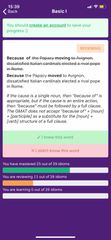
Noun and not an action |
|
|
|
The idea take what prepositions? |
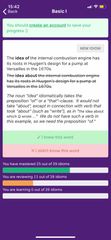
The idea of or the idea that |
|
|
|
Fascination with the utter simplicity...
Is with correct? |
Yes! Fascination with is a idiom. |
|
|
|
The idea depended .... his approval |
On
Depended on |
|
|
|
Allow with the meaning of permission is accompanied by which verb form? |
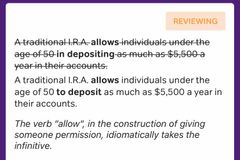
Infinitive to build |
|
|
|
When to use among vs between? |
Among is for more than 3 things Between is for 2 things |
|
|
|
Each other vs one another, what is the difference? |
Each other - 2 things One another - at least 3 |
|
|
|
Cicero was both a clown as well as a master. |
It is wrong. Both is followed by and
Cicero was both a clown and a master |
|
|
|
Neither x .... y |
Neither X nor Y |
|
|
|
Either x .... y |
Either X or Y |
|
|
|
To contrast P ... Q |
To contrast P with Q |
|
|
|
Exemplify |
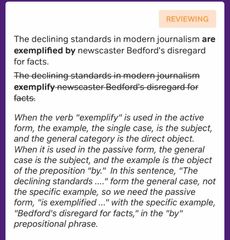
Back (Definition) |
|
|
|
Dated ..... 10 million years, At or from? |
Dated at |
|
|
|
If you choose leaving/to leave now |
To leave. If you chose to leave. Chose takes the infinitive |
|
|
|
It is seem as the consequence... |
The consequence of something |
|
|
|
The doctors have attributed.... |
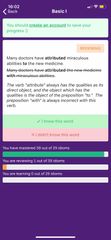
To! Never with |
|
|
|
Reported Speech should follow what rule? |
when a reporting verb is in the past tense (such as stated), the following conjugated Verb should also be in the past.
Example:
Last year John promised Jane that he would take her to the opera. |
|
|
|
announced maintained claimed argued are verbs that suggest what in a SC question? |
Reported speech. Jane claims that she will never eat meat. The second verb should follow the conjugation of the first. |
|
|
|
One vs. others |
"all the students want to do better than everyone else" is wrong Each student wants to do better than the other students - right the action is exclusive to each student and other is important because student A is part of the all. |
|
|
|
each other and one another |
similar. it is a one-to-one relationship.. E.G. All the students like each other Notice, neither of these structures could be used in a situation in which each person in the group is competing with all the rest and wants to be victorious over the others. |
|
|
|
One vs. many All the students are happy (plural) Every student is happy ( singular) |
It is correct! In some cases, we can state a fact about the members of group referring either to the whole group or to the individual members, and either way is perfectly fine. Sometimes, though, the nature of the situation involves something that each individual does separately. One “give away” can be the appearance of a personal possessive pronoun — if “his”, her”, “its”, or “their” shows up in the sentence |
|
|
|
All the questions have their own video explanation. Is it correct? |
Incorrect. Correct: Each question has its own video Every question has it own video |
|
|
|
Every US state has two senators, but the amount of representatives that all states have depends on their population. |
Correct would be: the number of representatives that each state has depends on its |
|
|
|
The twenty-four biochemical labs in the state all compete for shares of the same government allotment, and so all strive to present their case for funding more successfully than each other. |
Think about the competition. If I am in one lab, I want my lab to be more successful than whom?(A) “each other” – no, this is not the “each other”/”one another” case.(B) & (D) “the others” – maybe(C) “one other team” – no, a lab want to beat all others, not just one other Correct: [C] each strives to present its case for funding more successfully than the others each one strives. individual not all. |
|
|
|
The company is fortunate to have excellent relationships among its employees: they each have a relationship of respect for all the others. |
(B) they have respect for one another this is a situation in which there is the same relationship, respect, between any possible pair of people in the group. This is a situation that calls for the structure “each other” or “one another”. these structure, “each other” and “one another”, demand a plural subject. |
|
|
|
In a typical relay race, the baton is passed from one runner to the next on the same team, and each team wants its last runner to finish before any other team’s can do so. |
repeating a predicate. When the same action is repeated in a sentence, we can repeat the same verb “… before any other team’s can finish” or we can use the generic substitute “… before any other team’s can do so.” Either is correct. It is correct! |
|
|
|
What should you do in CR questions? |
1) Recognize the type of question 2) What information do i expect to find in the argument? What is important? Desconstruct the argument 3) What is the goal for this type of question? What characteristics must the correct answer have? 4) What kind of traps will be set for me? What are the common wrong answer types for this question? Work from wrong to right |
|
|
|
CR The assumption |
Always contain a conclusion Find the assumption What does the other assume is true when drawing the conclusion Flaw The author assumes something, but that thing might not be true. What is the flaw? Evaluate the argument What information would help determine whether the conclusion is more or less likely to be valid Strengthen and Weaken the Conclusion. What new information would help to make a conclusion less or more valid? |
|
|
|
CR The evidence family |
Do not have conclusions. Inference Given the information in the argument, which must be true? Explain a Discrepancy (paradox) The argument contains some surprising info or outcome. Which answer provides info that clears up this surpassing factor? |
|
|
|
CR The structure family |
Contains conclusion. More abstract. Discusses the characteristics of pieces of the argument Describe the role (boldface) The boldface plays what kind of role in the argument? Describe the argument These are variant of the boldface. |
|
|
|
what is considered double negative? |
no, not neither, never, none, nothing, nowhere, nobody, no one hardly, seldom, rarely, scarcely, barely
EG - Nobody has never (double negative)
The correct is: Nobody has ever |
Un Dis In
Not negative |
|
|
Can we use will after if/unless? |
No! Use would! The will can only be in the result part not the condition. Conditional 1 If/Unless condition in present tense, result in future/present tense. Result in future/present tense if/unless condition in present tense. If John asks for a raise, he will probably get one. John will probably get a raise if he asks for one. |
|
|
|
What is the 2 main characteristics of condition 1 |
The two main characteristics of Conditional 1 sentences are: 1. They deal with future situations. 2. The result is realistic or possible. If John drops the pen, it will land on the floor. |
|
|
|
If John asks Jane to marry him, she will probably agree. What kind of conditional is this? |
Conditional 1 Any type of Present - simple, progressive, or perfect - can be used in the condition part of Conditional 1 sentences Do not use the past! |
|
|
|
If John were a dog, he would be a Labrador. If John owned a dog, it would be a Labrador. What kind of conditional sentences are these? |
Conditional 2 sentences are used to describe hypothetical situations. The two main characteristics of Conditional 2 sentences are: 1. They deal with hypothetical present situations with conditions that are unlikely or even impossible to be met. 2. The result is unrealistic or impossible. |
|
|
|
What is the structure of conditional 2? |
If/Unless condition in past simple tense,result in future past tense. EG (both are correct) If John had more time, he would exercise after work. John would exercise after work if he had more time. |
|
|
|
If John had called Jane 15 minutes later than he did, he would have missed her. What kind of conditional sentences are these? |
The third conditional, also known as the past unreal conditional, describes hypothetical situations that could have happened in the past but did not. The two main characteristics of Conditional 3 sentences are: 1. They deal with hypothetical situations from the past that did not occur. 2. The result is always unrealistic because the moment has passed or, in other words, "it's too late." |
|
|
|
What is the structure of conditional 3? |
If/Unless condition in past perfect tense, result in future past perfect tense. If John had prepared for the GMAT better, he would have scored much higher. |
|
|
|
What kind of conditional sentence is this? Had Jane worn a scarf, she wouldn't have caught a cold. |
In Conditional 3 sentences, if may be omitted. In such cases, the condition part will begin with the word had. OBS: In Conditional 3 sentences, would can be replaced by could/should/may/might. John might have caught a cold if he had walked home last night. |
|
|
|
It is thought that more than half of the cat population would be Tabby if cats were allowed to breed indiscriminately. |
What kind of conditional is this? Conditional 2 If/Unless condition in past simple tense,result in future past tense. It is not Conditional 3. Conditional 3 is past perfect and future past perfect. do not mix |
|
|
|
In addition to the great benefits mankind has enjoyed since the discovery of certain technologies, many atrocities would have been prevented had the scientists who made the discoveries had the wisdom to discard such power. Is it correct? Explain |
Yes! The result part is not underlined, so it must be correct. It is in Future Past Perfect(would have been), which indicates Conditional 3. Therefore, the condition part must also be consistent with Conditional 3, that is, must be in Past Perfect, as is the case in this answer choice (had had). In Conditional 3 sentences, if may be omitted, in which case the condition part begins with the word had (as it does in this and in some of the other answer choices). |
|
|
|
what kind of words are not considered negatives? |
Words beginning with un- (e.g., unhappy, unhealthy), in- (e.g., inaccurate, insane), dis- (e.g., disappear, disbelieve) are NOT negation words |
|
|
|
she carried the trunk up the staircase, which caused her to sweat the whole way up. What is wrong? |
Which just modifies nouns. In this case the only staircase. Better: She carried the trunk up the staircase, sweating the whole way up. Sweating modifies the clause, the action. |
|
|
|
She carried the trunk up the staircase and sweated the whole way up. What is wrong? |
Grammatically is perfect, but the example below connects the meaning of why she was sweating. This sentence does not link the actions. Just numbers that she did 2 actions Better: She carried the trunk up the staircase, sweating the whole way up. |
|
|
|
Meaning issue While gives a sense of contradiction |
Be aware of the meaning in question that while have. |
|
|
|
When doing SC question what should you look for? |
Grammatically incorrect / logical answer choices are immediately eliminated Stylistically flawed answer choices may or may not be eliminated based on the other options Answer choices that change the meaning are eliminated |
|
|
|
As a result of a supernova explosion, every human being on Earth was bombarded on February 23, 1987, by about 100 billion neutrinos; fortunately, neutrinos are harmless elementary particles that are produced in nuclear reactions and that interact very weakly with matter. |
it is correct! Neutrinos are harmless. Grammar is fine. Meaning is fine it is parallel, check the that before are produced |
|
|
|
Unlike is used for comparison What should you be aware of? |
that the things being compared are comparable!
We cannot compare workers with a severance package. We compare workers with workes. |
|
|
|
what to do in inference questions? |
draw a conclusion based on the premises in the question there is no conclusion in the argument. DO NOT PRESUPOSE ANY ASSUMPTIONS - MAKE ONE SMALL STEP BEYOND THE PREMISE with the same tone Do not find new premises, be aware it is trying to distract you. this question uses conclude, conclusion, infer or inference. |
|
|
|
What are common distractors in CR questions? |
1) Brands and Product 2) Trend vs Absolute number 1) It might try to confuse it to think they are the same thing. they are not. Car sales dropped by 12% [Product] However, Toyata sales leapt up by 31% [Brand]. they are not interchangeable. Not all jeans are Levis. |
|
|
|
What should you remember about assumption questions? |
Find the assumtion that leads from the premise to the conclusion. In assumption questions beware of answer choices that introduce a new premise, rather than linking between premises The assumption does not need to be logical or valid. This question uses assumption in the question stem. |
|
|
|
beware vs be aware |
beware - be cautious, danger. be aware - be conscious |
|
|
|
call into question, cast doubt, undermine are words used in what kind of CR question? |
weakening |
|
|
|
what should you look for as an answer in paradox question? |
look for a premise (new) that reconciles the paradox. Paradox questions do not have conclusion |
|
|
|
Profit in Cr questions? What to do? |
Profit = revenue - expenses Write it down |
|
|
|
What to look for in flaw CR questions? |
look for differences in terminology between the premise and the conclusion. eg buying vs consuming, profit vs sales... |
|
|
|
Credit.... starting the first. What is the prepositions |
Credit with |
|
|
|
Although John never means to do harm or hurt Jane, he sometimes reduces her to tears |
The correct form is to do harm to
needs preposition. |
|
|
|
like vs as |
such as is used as example. "Like" is a preposition that means "similar to". A preposition is a word that positions nouns in relation to one another, i.e. the when, where, and how regarding the noun’s role in a sentence: in the house, at home, like him etc "As" is a conjunction. A conjunction is a more simple connecting word— it can connect everything from full sentences to individual words and does not itself define the relationship between the two items it connects (which prepositions such as ‘around’, ‘above’, and ‘like’ do). Other conjunctions include ‘and’, ‘but’, ‘so,’ etc. |
|
|
|
Paul demonstrated tenacity for the role and sensitivity to each of his clients’ unique needs, as the sales managers before him. |
a needs a verb. the correct form is: like the sales managers before him |
|
|
|
RC What kind of question has this stem? the passage is primarily concerned with which o the following?
|
Main ideia It is general Beware of answer choices which are too narrow or cites details from the passage or too broad and general |
|
|
|
RC The author suggests that The author implies that |
Inference question. Specific and implied. Beware of copy info and answer that stray from the passage. The answer should be only a small step beyond what is stated |
|
|
|
RC one function of the third paragraph is to... |
Structure question General - the answer can be found in the initial reading
Understand the structure. Look for words such as however, still, for example... |
|
|
|
RC Which of the following is mentioned in the passage ? According to the passage ... ... is supported by the information in the passage |
Detail question Specific and is stated. Describe what is said in the passage. Beware of details that are not of that paragraph and distortions ( replacing hill with mountain...)
Look for synonyms (die with perish) and different word order with the same meaning |
|
|
|
RC The author of the passage most probably discusses x in order to.... |
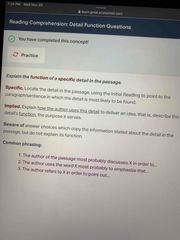
Implied Specific How the author uses the detail |
|
|
|
RC The author is most likely to agree with which of the following statements about X? X is similar to which of the following? |
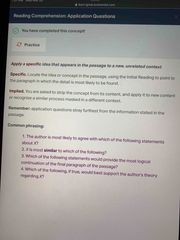
Specific Implied New unrelated context Stray the furthest |
|
|
|
The attitude of the author of the passage toward X is best described as |
Identify the tone Specific or general Implied - what is the atitude Beware of answer choices which are radical, disrespectful and undermine American values
Words that are prohibited absolute, absolutely, complete, extreme, total, utter Absolute, agitated, condescending, cynical, derogatory, fervent, harsh Amusement, astonishment, contempt, disdain, skepticism |
|

